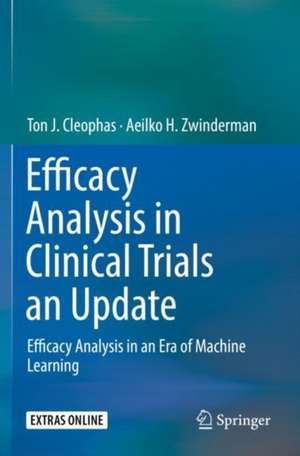Efficacy Analysis in Clinical Trials an Update: Efficacy Analysis in an Era of Machine Learning
Autor Ton J. Cleophas, Aeilko H. Zwindermanen Limba Engleză Paperback – 25 sep 2020
Modern medical computer files often involve hundreds of variables like genes and other laboratory values, and computationally intensive methods are required
This is the first publication of clinical trials that have been systematically analyzed with machine learning. In addition, all of the machine learning analyses were tested against traditional analyses. Step by step statistics for self-assessments are included
The authors conclude, that machine learning is often more informative, and provides better sensitivities of testing than traditional analytic methods do
| Toate formatele și edițiile | Preț | Express |
|---|---|---|
| Paperback (1) | 466.38 lei 38-44 zile | |
| Springer International Publishing – 25 sep 2020 | 466.38 lei 38-44 zile | |
| Hardback (1) | 720.84 lei 3-5 săpt. | |
| Springer International Publishing – 25 sep 2019 | 720.84 lei 3-5 săpt. |
Preț: 466.38 lei
Preț vechi: 490.93 lei
-5% Nou
Puncte Express: 700
Preț estimativ în valută:
89.26€ • 96.35$ • 74.85£
89.26€ • 96.35$ • 74.85£
Carte tipărită la comandă
Livrare economică 15-21 aprilie
Preluare comenzi: 021 569.72.76
Specificații
ISBN-13: 9783030199203
ISBN-10: 3030199207
Pagini: 304
Ilustrații: XI, 304 p. 295 illus., 44 illus. in color.
Dimensiuni: 155 x 235 mm
Ediția:1st ed. 2019
Editura: Springer International Publishing
Colecția Springer
Locul publicării:Cham, Switzerland
ISBN-10: 3030199207
Pagini: 304
Ilustrații: XI, 304 p. 295 illus., 44 illus. in color.
Dimensiuni: 155 x 235 mm
Ediția:1st ed. 2019
Editura: Springer International Publishing
Colecția Springer
Locul publicării:Cham, Switzerland
Cuprins
Preface.- Traditional and Machine-Learning Methods for Efficacy Analysis.- Optimal-Scaling for Efficacy Analysis.- Ratio-Statistic for Efficacy Analysis.- Ratio-Statistic for Efficacy Analysis.- Complex-Samples for Efficacy Analysis.- Bayesian-Networks for Efficacy Analysis.- Evolutionary-Operations for Efficacy Analysis.- Automatic-Newton-Modeling for Efficacy Analysis.- High-Risk-Bins for Efficacy Analysis.- Balanced-Iterative-Reducing-Hierarchy for Efficacy Analysis.- Cluster-Analysis for Efficacy Analysis.- Multidimensional-Scaling for Efficacy Analysis.- Binary Decision-Trees for Efficacy Analysis.- Continuous Decision-Trees for Efficacy Analysis.- Automatic-Data-Mining for Efficacy Analysis.- Support-Vector-Machines for Efficacy Analysis.- Neural-Networks for Efficacy Analysis.- Ensembled-Accuracies for Efficacy Analysis.- Ensembled-Correlations for Efficacy Analysis.- Gamma-Distributionsfor Efficacy Analysis.- Validation with Big Data, a Big Issue.- Index.
Notă biografică
The authors are well-qualified in their field. Professor Zwinderman is past-president of the International Society of Biostatistics (2012-2015), and Professor Cleophas is past-president of the American College of Angiology (2000-2002).
Five textbookscomplementary to the current production and written by the same authors are
Professor Zwinderman is one of the Principle Investigators of the Academic Medical Center Amsterdam, and his research is concerned with developing statistical methods for new research designs in biomedical science, particularly integrating omics data, like genomics, proteomics, metabolomics, and analysis tools based on parallel computing and the use of cluster computers and grid computing.
Professor Cleophas is a member of the Academic Committee of the European College of Pharmaceutical Medicine, that provides, on behalf of 22 European Universities, the Master-ship trainings "Pharmaceutical Medicine" and "Medicines Development".
From their expertise theyshould be able to make adequate selections of modern methods for clinical data analysis for the benefit of physicians, students, and investigators. The authors have been working and publishing together for 18 years, and their research can be characterized as a continued effort to demonstrate that clinical data analysis is not mathematics but rather a discipline at the interface of biology and mathematics.
The authors as professors and teachers in statistics at universities in The Netherlands and France for the most part of their lives, are concerned, that their students find regression-analyses harder than any other methodology in statistics. This is serious, because almost all of the novel methodologies in current data mining and data analysis include elements of regression-analysis, and they do hope that the current production "Regression Analysis for Starters and 2nd Levelers" will be a helpful companion for the purpose.
Statistics applied to clinical studies 5th edition, 2012,
Machine learning in medicine a complete overview, 2015,
SPSS for starters and 2nd levelers 2nd edition, 2015,
Clinical data analysis on a pocket calculator 2nd edition, 2016,
Modern Meta-analysis, 2017
Regression Analysis in Medical Research, 2018
all of them published by Springer
Textul de pe ultima copertă
Machine learning and big data is hot. It is, however, virtually unused in clinical trials. This is so, because randomization is applied to even out multiple variables.
Modern medical computer files often involve hundreds of variables like genes and other laboratory values, and computationally intensive methods are required.
This is the first publication of clinical trials that have been systematically analyzed with machine learning. In addition, all of the machine learning analyses were tested against traditional analyses. Step by step statistics for self-assessments are included.
The authors conclude, that machine learning is often more informative, and provides better sensitivities of testing than traditional analytic methods do.
This is the first publication of clinical trials that have been systematically analyzed with machine learning. In addition, all of the machine learning analyses were tested against traditional analyses. Step by step statistics for self-assessments are included.
The authors conclude, that machine learning is often more informative, and provides better sensitivities of testing than traditional analytic methods do.
Caracteristici
It shows, for the first time, that machine learning methodologies can be used for assessing efficacy data of controlled clinical trials It confirms, that machine learning methodologies provide better sensitivity of testing It confirms, that machine learning methodologies are more informative
